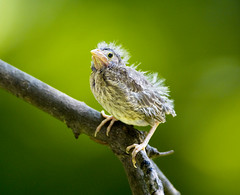Don't be too timid and squeamish about your actions.
All life is an experiment.
The more experiments you make the better.
-- Ralph Waldo Emerson
I think that curiosity has been a driving power in my live, and although I've been singed a few times, I still have a few lives left. Curiosity is what leads to experimentation. If you get caught in the same rut, you need to experiment with some aspects of what you're doing, even though it might be hard not to be squeamish!
You can start in the kitchen. Try using a cookbook instead of a prepared meal or package mix. And then see what happens if you vary an ingredient.
(I admit that not all ingredients can be experimented with! When I lived in Denmark, and American friend was trying to bake some traditional Danish cookies using a recipe in Danish. She came across a word she didn't know (which happened to be for baking powder) so she substituted a spice for it. Turned into very aromatic rocks!)
My son got sent to what they called the "Observation Clinic" in Danish schools after making a little experiment in science class, which the teacher caught just before it exploded. One of my colleagues figured he'd end up a great scientist! At least he's ended up a very good computer developer with a lot of good ideas.
When I had been teaching English and German in Denmark for about 6 years, I started to think that I knew pretty much what my life would be like the next 25 years or so. That didn't leave much room for experiments - even though being a teacher in Denmark provided a lot more room for experimenting with curriculum than it appears to be possible here. So I quit teaching and have been experimenting with careers ever since: translator, diaper-service owner/manager/designer..., environmental manager, technical writer, web designer, graphic designer - and now back to teaching, but this time Math. Not all of these experiments were financially successful, but every one of them has developed my knowledge and skills in many different ways. Now I am looking at a career that could last another 5-10 years. That seems like a reasonable length for this experiment.
Encourage students to experiment
I think one of the important things a teacher should do is to encourage students to attack problems in their own way. We can be helpful to show them a few different ways to do things, and then let them do it their way after that. Or let them experiment to find their own way to attack a problem.
I'm mostly thinking Math, now, of course, but this fits for many subjects. When I taught languages in Denmark, I usually only had a very short lesson plan for how to deal with the texts we were reading, including a point or two I wanted to get across. But it was wonderful when the student discussion went its own direction, so that they were expressing their own thoughts. I was dismayed when I did some subbing at a different school once, where the students expected me to write the "right" analysis on the blackboard so they could copy it into their notes. I told my students that the best way to get a good grade in my classes was for them to introduce me some new way of looking at a text!


